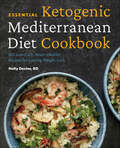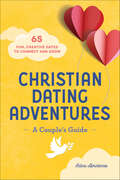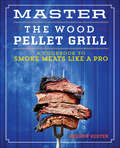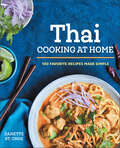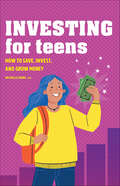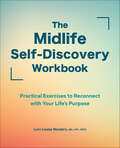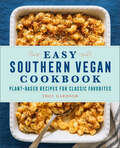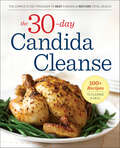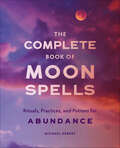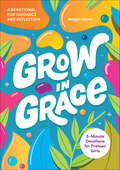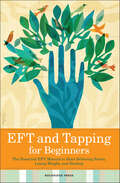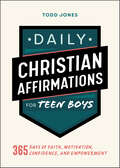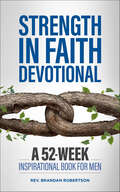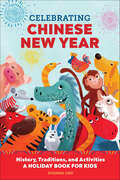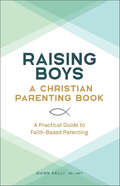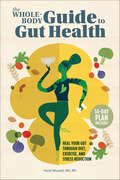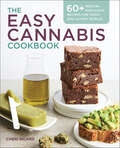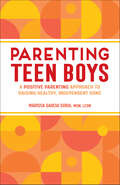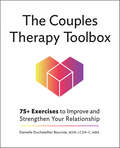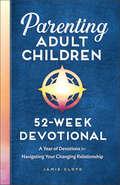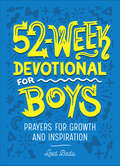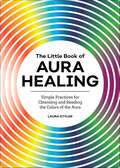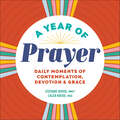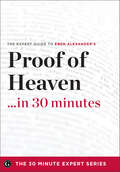- Table View
- List View
Essential Ketogenic Mediterranean Diet Cookbook: 100 Low-Carb, Heart-Healthy Recipes for Lasting Weight Loss
by Molly DevineThe heart-healthy Mediterranean diet meets the fat-burning power of keto!The Mediterranean diet has long been revered as one of the healthiest ways to eat—but what if you could make it even better? The Essential Ketogenic Mediterranean Diet Cookbook combines the heart-healthy and fiber-rich foods and healthy lifestyle habits of the Mediterranean diet with the low-carb, moderate-protein, and high-fat ratios of the ketogenic diet. Discover this powerhouse combination diet that will help you lose weight, improve your cardiac and gut health, and feel more energized.The Essential Ketogenic Mediterranean Diet Cookbook outlines the hows and whys of the diet in detail and provides two weeks of meal plans to get you started. Including 100 delicious recipes like Greek Egg and Tomato Scramble and Braised Short Ribs with Red Wine, the dishes also use everyday ingredients to set you up for sustainable, long-term success.This ketogenic Mediterranean diet cookbook includes:Best of all worlds—From weight loss to cardiac health to improved cognitive function, see why this diet is a winning combination.Understand the science—An explanation of macronutrients and how our bodies burn fuel will help you understand the science of the diet and why it works.Jumpstart your new lifestyle—Comprehensive shopping lists and meal plans guide your successful transition into ketosis.Add the calorie-burning science of Keto to one of the most recognized, natural food-based diets in history and you get The Essential Ketogenic Mediterranean Diet Cookbook.
Christian Dating Adventures: A Couple's Guide
by Selina AlmodovarDiscover fulfilling date ideas for building a strong, faith-based connection Deepen your relationship, strengthen your faith, and have fun! No matter how long you've been together, Christian Dating Adventures is packed full of memorable date ideas perfect for any Christian couple. Nurture your connection with your partner and with God as you watch a sunrise, go on an impromptu road trip, or volunteer together within your church or community.Go beyond other dating books with:Dates for every occasion—Find ideas that are ideal for quiet nights at home, exciting outdoor adventures, group dates, holidays, and more.Faith-based guidance—Keep God in the center of your relationship through Scripture, discussion, and spiritual insights.Tips for couples—Make sure every date—whether it's your first or fiftieth—is memorable and meaningful with thoughtful advice for getting the most out of each experience.Grow closer together through the power of your faith with this dating book for Christian couples.
Master the Wood Pellet Grill: A Cookbook to Smoke Meats Like A Pro
by Andrew KosterMaster your wood pellet grill this summer and become a smokin' sensation.Burgers and dogs are just fine for backyard get-togethers, but if you want to heat things up and become the grilling and smoking legend of the neighborhood, pick up Master the Wood Pellet Grill. Things really get cooking when you perfect the art of smoking any type of meat with this pellet grill cookbook.This goes way beyond a basic pellet grill cookbook. Learn unique methods to heighten the flavors of some of your favorite meats, like using mustard as a binder for ribs, reverse searing on tri-tip, and rubbing seasoning under the skin of turkey and chicken.Celebrate grilling season or give the ultimate grilling gift with:Quality and quantity—Discover ways this pellet grill cookbook will make all of your dishes stand out with homemade rubs and marinades.T.L.C.—Find out how to select, prepare, rest, and cook your preferred cuts of meat.Troubleshooting—Check out this section in your pellet grill cookbook for answers to issues like unwanted temperature swings, igniter trouble, and the loss of fire while in smoke setting.If you're looking for the tastiest recipes for your favorite meats, get this pellet grill cookbook—it's smoking!
Thai Cooking at Home: 100 Favorite Recipes Made Simple
by Danette St. OngeFast, simple, and scrumptious Thai food—no restaurant required.Create the exciting flavors of your favorite Thai meals in your own kitchen—no delivery necessary. The Better-than-Takeout Thai Cookbook reveals the secrets to making iconic dishes and introduces a menu of new options to discover.The Better-than-Takeout Thai Cookbook shows you how to easily prep your pantry so you'll be ready to cook in 30 minutes or less. You'll even learn how to make curry paste from scratch to have on hand for last-minute meals. Alongside the recipes, this Thai cookbook includes serving suggestions, convenient ingredient swaps, and more.Inside The Better-than-Takeout Thai Cookbook, you'll find:Quick Thai cooking—Make flavorful meals in less than 30 minutes by keeping a handful of signature ingredients in your cupboard.A menu of favorites—Find the dishes you crave in chapters organized like a Thai restaurant selection: Noodles, Soups and Salads, Curries, Seafood, and more.100 recipes—Enjoy classic restaurant dishes like Pad Thai and Yellow Curry with Chicken and Potatoes, or try something new like Thai-Style Omelet or Jungle Curry.Thai food is better homemade with The Better-than-Takeout Thai Cookbook!
Investing for Teens: How to Save, Invest, and Grow Money
by Michelle HungStart getting savvy about money—an investment guide for teens You don't have to work on Wall Street to know that money is essential! Learn how to handle it responsibly—and how to make it work for you. Let this teen investing book be your guide to money matters ranging from the difference between stocks and bonds to ways to research potential investments. Soon enough you'll be throwing around terms like dividend and liquidity like a finance professional.Smart money moves—Learn how to set financial goals, create a budget, and recognize the difference between good debt and bad so you can make calculated decisions with your money.Master the market—Explore all the different ways people invest their money and assess their risk tolerance with a crash course in the stock market.Teen-specific tips—Get advice that's geared toward teens, including pointers on landing a summer job and creating saving plans for life after high school.Manage your money like a boss and begin building personal wealth with Investing for Teens.
The Midlife Self-Discovery Workbook: Practical Exercises to Reconnect with Your Life's Purpose
by Lynn Louise WondersLearn what makes you happy and find your purpose in midlife Midlife comes with changes that can feel surprising and disorienting, but it also offers the opportunity for transformation and joyful adventure. The Midlife Self-Discovery Workbook provides tools, support, and exercises that will help you navigate the midlife journey with a refreshed perspective and renewed sense of purpose.Rediscover yourself—Assess how satisfied you are with life right now, journal about the lessons you've learned from your past, and create a personalized midlife renewal plan.Get excited about midlife—Become more optimistic about midlife as you spend time re-evaluating your values, goals, and dreams. You'll focus on positivity by learning how to monitor self-talk, embrace your core values, and put a halt to limiting thoughts.Find inspiration in real people—Get motivated and feel a sense of reassurance by reading real stories of people who've worked through the challenges of midlife, like divorce, health issues, and aging children, and found true contentment.Get to know yourself again and embrace change and personal growth using The Midlife Self-Discovery Workbook.
Easy Southern Vegan Cookbook: Plant-Based Recipes for Classic Favorites
by Troy GardnerSatisfy your cravings with vegan Southern classics Great news! You can eat vegan and still enjoy all the beloved, belly-warming flavors of Southern comfort food. This cookbook shows you how, walking you through the ingredients and techniques you need to serve up plant-based versions of everything from jambalaya to peach cobbler.Start with the staples—Get a crash course in vegan cooking, and learn how to re-create the signature flavors of buttermilk, mayonnaise, andouille, and more with plant-based foods.Simple cooking methods—Save time and hassle with 75 recipes that only require a handful of basic ingredients—many of them can even be made in 30 minutes, in one pot, or prepared ahead of time.Familiar flavors—Dig into Vegan Chicken Gumbo, Four-Bean Chili, Creamy Cajun Pasta, Jackfruit Barbacoa Tacos, Beer-Battered Okra, Bourbon Pecan Pie, and more.Build a healthier Southern kitchen today with the Easy Southern Vegan Cookbook.
The 30-Day Candida Cleanse: The Complete Diet Program to Beat Candida and Restore Total Health
by Rockridge PressPain, discomfort, and suffering don't have to be part of your daily routine, but eating the right foods does.The 30-Day Candida Cleanse is your guide to stopping candida in its tracks through natural methods, so that you can finally be healthy, energetic and pain-free. With a 30- and 90-day program and over 100 delicious and nourishing recipes, The 30-Day Candida Cleanse will help you cleanse your body of candida once and for all, and prevent future infections.Cleanse candida from your system permanently, with:Holistic 30- and 90-day programs to beat candida permanently 100+ satisfying, nutrient-rich recipes to keep your body balanced Easy-to-follow meal plans to help you cleanse your body, and maintain a balanced system A handy guide to dining out on a candida cleanse Candida Q&A to help you understand how candida is effecting your body You don't have to live with uncomfortable symptoms, balance your system and fight the dangers of candida overgrowth with The 30-Day Candida Cleanse.
The Complete Book of Moon Spells: Rituals, Practices, and Potions for Abundance
by Michael HerkesUse the magical power of the moon to manifest love, money, health, and success.For centuries, the moon has enchanted generation after generation with its beauty and might. This comprehensive guide documents the science, folklore, and phases of the moon and applies it to the art of practicing moon spells. Master the rituals and potions for attracting money, love, and success with this complete book of moon spells by The Glam Witch. Also known as Michael Herkes, the author is a trusted tarot reader, nationwide speaker, and a regular contributor to Witch Way Magazine. In this primer, he shares his moon magic wisdom to help you achieve your goals and desires.The Complete Book of Moon Spells will teach you to:Harness the power of the moon—with an understanding of a brief history of moon magic and the cycles and phases of the moon.Craft your own manifestation lunar tool kit—learn the methodology, impact of timing, and importance of space to cast your own moon spells.Set intentions and take action toward your goals—with a thought exercise in each section to reflect on your magical journey.Channel the power of moon magic to attract abundance in your life with The Complete Book of Moon Spells.
Grow in Grace: A Devotional for Guidance and Reflection
by Megan GoverGrow in Grace is a collection of devotionals for teen girls to help them stay connected to their faith and find strength in God's word as they face the exciting challenges of becoming a teenager.Middle school comes with its share of big changes and confusing thoughts—but you can help teens and preteens know they're not alone. Let faith guide them through school, friendships, and more with this Christian devotional!This book of devotionals for teen girls offers:The guidance they need—The prompts are not dated or numbered, so teen girls can turn to this devotional whenever they need to and pick the message that feels right—whether it's about making friends, overcoming disappointment, or sharing their strengths with the world.Prayer and reflection—Each 5-minute devotional includes a selection from Scripture, an insightful question, and space to write down personal thoughts.Share and be heard—These devotionals for teen girls will inspire conversation about feelings and faith within the whole family.Help young women grow in their faith and tackle the challenges of growing up with Grow in Grace!
Fibromyalgia Freedom!: Your Essential Cookbook and Meal Plan to Relieve Pain, Clear Brain Fog, & Fight Fatigue
by Kathleen StandaferFight fibro the natural way—with food.There's a vital connection between what you eat and how you feel. Fibromyalgia Freedom! helps you manage your fibromyalgia naturally by taking control of your nutrition. This gourmet meal plan targets pain, lethargy, indigestion, and cognitive "brain fog," so you can find relief—and still eat well.The 4-stage plan starts you on a targeted diet, removing problematic foods to give your body a chance to heal. Over 110 recipes give you lots of engaging options to further reduce fibromyalgia symptoms. The recipes are brain- or immunity-boosting, and many are free of gluten, dairy, or allergens like nuts.In Fibromyalgia Freedom!, you'll find:4-week meal plan—Address fibromyalgia symptoms in four stages: Pain Management, Gaining Energy, Fighting Brain Fog, and Promoting Healthy Digestion.110+ nourishing recipes—Enjoy Thai Coconut Milk Soup, Crispy Baked Parsnip Fries, Italian-Style Meatballs, Creamy Chocolate Mousse, and more.Symptom tracking—Regain control of your health using a guided tracking strategy, made easy with charts for your symptoms, foods, and weekly progress.This holistic approach to fibromyalgia treatment will put you on the path to a more stress-free and symptom-free life.
EFT and Tapping for Beginners: The Essential EFT Manual to Start Relieving Stress, Losing Weight, and Healing
by Rockridge PressNow there is a simple, effective, noninvasive, and drug-free way to use your body's own healing mechanisms to overcome physical and emotional pain. Emotional Freedom Technique (EFT) and tapping consist of activating energy points along one's body in much the same way acupuncture relieves pain-except without the needles! Energy blockages are cleared quickly and effectively, allowing for healing and a sense of overall well-being. It is a safe and easy way to relieve stress, anxiety, and depression and to control weight gain and physical pain. With EFT and Tapping for Beginners: Practice the basic tapping sequences using helpful illustrations that show you the exact energy points to activate on your head, hands, and torso. Learn how to focus your thoughts and tapping goals with freewriting and journaling. Begin experiencing relief from stress and everyday anxieties. Use tapping to help manage the root causes of weight gain and the physical symptoms associated with diabetes, high blood pressure, persistent pain, and more. EFT and Tapping for Beginners: The Essential EFT Manual to Start Relieving Stress, Losing Weight, and Healing not only helps you learn the tapping process, but also invites you to look at the causes of emotional and physical pain. Begin healing today with this concise guide.
Daily Christian Affirmations for Teen Boys: 365 Days of Faith, Motivation, Confidence, and Empowerment
by Todd JonesThis book of affirmations pairs powerful excerpts from Scripture with 365 daily messages of inspiration and positivity for teen boys. Being a teen isn't easy, but teens can always take comfort in God's Word. With His support, teen boys can take on the day's challenges with confidence. This book contains daily affirmations and positivity to support teen boys with whatever they might be going through.Brief and easy—Each affirmation takes just a minute or two to read, and they aren't dated, so teen boys can open the book to any page they like.Making a consistent habit—By spending a moment with God every day, teen boys can refocus their energy on the things that matter—and grow stronger through His love.A year of prompts—Find a prompt for each day of the year that includes a quote from the Bible and a simple explanation that helps teens understand it.The opportunity to build their sense of strength and self in just a few minutes each day can happen with Daily Christian Affirmations for Teen Boys!
Strength in Faith Devotional: A 52-Week Inspirational Book for Men
by Brandan RobertsonStrengthen your connection to God—a year of powerful devotions for menEven in the busiest week, there's always a moment to connect with God. Tap into the Bible's life-transforming wisdom with the Strength in Faith Devotional. This men's devotional goes beyond other inspirational books for men with 52 weeks of Scripture passages, insightful stories, and practical lessons. Explore the Bible's teachings in your everyday life—and strengthen your connection with God.Each week begins with a Scripture reading and accompanying essay. Explore themes you won't find in other inspirational books for men, like "The Forgiveness Factor," "Wage Peace," "The Comparison Trap," and "Servant Leadership"—to guide you through issues at work, relationships, and home.Inside this standout among inspirational books for men, you'll find:A year in faith—52 devotions provide easy weekly structure; with no start date, you can move at your own pace.Writing and reflection—Jot down your thoughts at the end of each devotional—this engaging choice in inspirational books for men includes dedicated space to write.Take it away—Helpful summaries after each devotion give you concrete suggestions for applying the week's lesson to your life.With a year of devotionals to challenge and support you, Strength in Faith Devotional is everything inspirational books for men should be.
Celebrating Chinese New Year: History, Traditions, and Activities (Holiday Books for Kids)
by Eugenia ChuCelebrate Chinese New Year with this festive introduction for kids ages 6 to 9 Chinese New Year, also called the Spring Festival or Lunar New Year, is one of the most celebrated holidays around the world. This engaging book for kids explains the history, folklore, traditions, and customs of Chinese New Year and includes interactive activities that encourage kids to celebrate at home or in their communities.This Chinese New Year kids' book includes:Diverse traditions—From festivals and parades to relaxation and cooking, kids will learn how Chinese New Year is celebrated in different ways.Fun, hands-on activities—Kids can explore a variety of ways to get festive, like making Chinese dumplings, paper lanterns, and their very own Chinese Zodiac calendar.Fascinating facts and pictures—Colorful illustrations and fascinating factoids help bring Chinese New Year to life for your child.Get little ones excited to learn about this beloved holiday with this standout among Chinese New Year books for kids.
Raising Boys: A Practical Guide to Faith-Based Parenting (Raising Girls: A Christian Parenting Book)
by Quinn KellyWeave the Bible's wisdom into your parenting and instill faith in your son As a parent, you will always be your son's first and most powerful influence—which is why it's so important to raise him with God by your side. This guide is full of practical parenting advice and spiritual insights that show you how to root your parenting in God's Word and raise your son with intention and care.What sets this guide apart from other Christian parenting books:The basics of raising boys—Discover how your son's emotional and physical development impact your parenting style, and define the values and goals that keep him close to Christ.Parenting principles—Explore Bible-based principles that help you model your faith, set and respect boundaries, and create the foundation for a relationship based on love, trust, and understanding.Targeted techniques—Learn specific strategies for affirming your son's self-worth, dealing with bullies, navigating social media, and more.Be the wise and Christ-honoring parent your son deserves with help from this modern, Scripture-based guide.
The Whole-Body Guide to Gut Health: Heal Your Gut Through Diet, Exercise, and Stress Reduction
by Heidi MorettiHelp get your gut back on track with this simple, whole-body planYour gut encompasses your digestive organs and all their resident microbes—and its health affects all the other systems in your body. Experience the physical and mental benefits of a healthy gut biome with this research-based guide. Find out how to care for your body, alleviate digestive distress, and soothe a wide variety of ailments, from heartburn and irritable bowel syndrome to depression and anxiety.Learn the five principles of good gut health, explore the science of probiotics, and refer to at-a-glance lists of foods to enjoy, limit, or avoid. Go deeper with practical advice for exercise, stress reduction, and mindfulness practices to help boost your overall mood, energy, and even your memory.A holistic 2-week plan—Kick-start your gut health routine with a customizable 2-week plan that incorporates healthy eating, exercise, meditation, and more.Tasty, gut-healthy recipes—Treat your gut right with 50 feel-good options like the Lemon-Ginger Smoothie, Wild Salmon and Fennel Scramble, Fermented Fried Rice with Vegetables, and more.Simple symptom tracking—Use a handy template to track your symptoms, identify possible triggers, and chart your progress as you make changes.Help restore balance in your gut with The Whole-Body Guide to Gut Health.
The Easy Cannabis Cookbook: 60+ Medical Marijuana Recipes for Sweet and Savory Edibles
by Cheri SicardThe definitive guide to making easy, everyday ediblesGo beyond just cookies and brownies as you learn how to serve up delicious edibles perfect for every meal with this comprehensive exploration of cooking with cannabis.Written by Cheri Sicard—nicknamed the "Martha Stewart of weed" by The Daily Beast—this cannabis cookbook provides you with absolutely everything you need to redefine stoner eats. Whether it's Ganja Gazpacho, Barbecue Chicken, or Deviled Eggs, these simple and straightforward recipes make it a breeze to bring unique, properly dosed edibles to the table.This must-have marijuana cookbook includes:Cannabis 101—Discover a crash course on the history of marijuana and all the benefits it provides.Dosing guides—Find out how to measure potency and make sure your infusions meet their mark.Cooking fundamentals—Learn fundamental cooking skills, what equipment you need, and more.60 Tasty recipes—Go beyond cookies and brownies with recipes for breakfasts, lunches, dinners, and more.Get baked, roasted, and grilled cannabis-infused treats for every meal thanks to The Easy Cannabis Cookbook.
Parenting Teen Boys: A Positive Parenting Approach to Raising Healthy, Independent Sons
by Marissa Garcia SoriaRaise a resilient son with positive parenting Teen boys face a lot of unique struggles, especially these days, and figuring out how to guide them can sometimes be challenging. Enter Parenting Teen Boys. This book includes advice based on positive parenting principles that will help you support and connect with your son during this important time in your lives.What sets this book on parenting teens apart from other teen boy books:Become a positive parent—Learn how to communicate with your son and help him explore his strengths as you reframe challenges into opportunities for growth and acceptance.Learn all about teen boys—Read up on the history of teen boys and take a look at the unique challenges they face today so you can understand what your son is going through.Be an "emotion coach"—Learn how to handle social or behavioral issues by truly understanding their root causes and helping your son navigate his feelings.Discover how to parent in a way that nourishes the relationship between you and your son with this book for teen boys.
The Couples Therapy Toolbox: 75+ Exercises to Improve and Strengthen Your Relationship
by Danielle Duchatellier BoucreeCreate a stronger relationship with these therapy tools for couples Building a deep and lasting connection as a couple takes skills and practice. This couples therapy workbook has more than 75 evidence-based exercises and strategies to help you learn to communicate, develop trust, handle conflict, nurture intimacy, and foster a more equal, satisfying partnership—together.75+ exercises to try—Choose from a variety of exercises created by an experienced couples therapist, selecting the ones that feel most relevant to your relationship, and completing them at your own pace.Working together—Each exercise prompts both of you to discuss topics like setting goals for your relationship, defining boundaries, practicing healthy responses to criticism, and understanding each other's opinions and habits.Proven techniques—Explore guidance, writing prompts, and joint activities that are rooted in a range of effective therapy techniques, so you can better understand each other's thoughts and needs.For all couples—Discover tips and tools for making any relationship thrive, regardless of your age, lifestyle, past experiences, or time together.Embrace learning, connecting, and growing with The Couples Therapy Toolbox.
Parenting Adult Children: A Year of Devotions for Navigating Your Changing Relationship
by Jamie CloydReflect and pray as your children find their path When your children become adults, navigating your changing relationship with them can leave you feeling unsure of yourself. This devotional encourages you to rely on your faith for guidance and patience. It features a year's worth of weekly devotions to help you work through the challenges and appreciate the good times as your family grows up and evolves.What sets Parenting Adult Children apart from other parenting books:Moments of reflection—Find a variety of passages from Scripture, paired with words of wisdom and simple prayers that provide deep insight in just a few minutes each week.Meaningful guidance—Get advice for keeping a positive mindset about your child's future—whether they've moved back home, become distant, or need some extra support.Reassuring stories—Take comfort in relatable lessons and examples from the Bible, and the author's own experiences parenting adult children.Learn how to parent an adult child with a book of devotions and prayer that reminds you to be encouraging, welcoming, and loving.
52-Week Devotional for Boys: Prayers for Growth and Inspiration
by Lord BaduA year of devotions to guide boys age 8-10 as they grow in life and faithThis engaging 52-week boys' devotional explores inspiring passages from the Bible, showing boys how God's wisdom can help and support them as they grow. Spending a little time with His Word every week will help give boys the confidence to tackle anything—because they'll know God is cheering them on!Discover a devotional for kids that's full of:Real issues—Find God's guidance for being a good friend, dreaming big, not judging others, and more in these devotions for boys.Weekly Scripture—Each devotion features a Bible passage, stories and commentary that explain the theme, a little space to journal, and a prayer.Off-the-page ideas—This boys' devotional includes weekly ideas to put into action, like encouraging them to have heartfelt conversations with family.Help preteen boys grow into the smart and strong men God created them to be with this inspiring boys' devotional!
The Little Book of Aura Healing: Simple Practices for Cleansing and Reading the Colors of the Aura
by Laura StylerAwaken your personal power—easy techniques to understand, read, and heal your auraThe Little Book of Aura Healing is your beginner's guide to what your aura is and how you can heal and maintain it for better well-being. Begin with a brief background on how auras work before diving into specifics of each color, each layer, and practical aura balancing techniques that anyone can do. The Little Book of Aura Healing illuminates how your aura is connected to your physical, emotional, mental, and spiritual health.Start healing your aura right away with:Practical techniques—Explore simple practices for reading, healing, and strengthening your aura, with friendly language and helpful illustrations.Learn the signs—Discover ways to identify an aura that's imbalanced and how to align the energy of your thoughts, emotions, intentions, and actions for greater aural symmetry.The seven layers—Learn about the color, size, chakra, and personality traits associated with each of the seven main layers of your aura, and how to heal the ones that need your attention most.This book is your ultimate guide to auras and their colors as well as simple practices to read, cleanse, and heal them.
A Year of Prayer: Daily Moments of Contemplation, Devotion, & Grace (A Year of Daily Reflections)
by Stefanie Rouse Caleb RouseStrengthen your faith, one day at a time Learning to talk to God on a daily basis is the perfect way to help you grow your devotion and discover how He is always there to guide you through both the good and difficult times. Featuring a new entry each day, A Year of Prayer encourages you to build a prayer practice that will deepen your love for God, others, and yourself.This standout among prayer books features:365 days of faith—Get closer to God every day with a variety of daily practices, meditations, affirmations, and prayers.Brief entries—No matter how busy you get, you can make time for God with prompts that only take a few minutes to complete.Monthly themes—From love and joy to wisdom and thankfulness, each month centers around a different concept to help you focus your practice.Find strength in your faith with help from this daily prayer book.
Proof of Heaven . . . in 30 Minutes: The Expert Guide to Eben Alexander's Critically Acclaimed Book
by Eben AlexanderProof of Heaven ...in 30 Minutes is your guide to quickly understanding the spiritual lessons in Dr. Eben Alexander's life-changing book, Proof of Heaven: A Neurosurgeon's Journey into the Afterlife. In Proof of Heaven, neurosurgeon Dr. Eben Alexander recollects his near-death experience and how it convinced him that there was proof of heaven. As told in Proof of Heaven, Alexander had a brush with death while in a seven-day coma, during which he experienced a transformative spiritual journey. Though his neocortex, the part of the brain that's responsible for higher-level functions, was inactive the whole time, his conscious mind experienced rich spiritual realms, giving him proof of heaven existing. Formerly an atheist, Alexander recounts his spiritual transformation in Proof of Heaven and shares the truths he learned as a result of his journey. An essential read for believers and skeptics alike, Proof of Heaven provides readers insight into a neurosurgeon's experience with the afterlife. Use this helpful guide to understand Proof of Heaven in a fraction of the time, with tools such as: · A concise synopsis examining the remarkable near-death experience recounted in Proof of Heaven · In-depth analyses of Dr. Eben Alexander's spiritual transformation detailed in Proof of Heaven · Explanations of the three fundamental truths from Proof of Heaven, revealed to Alexander during his venture, and how to apply these lessons to your life · An insightful background on Alexander, a former associate professor of surgery at Harvard Medical School · An extensive recommended reading list and bibliography related to Proof of Heaven As with all books in the 30 Minute Expert Series, this book is intended to be purchased alongside the reviewed title, Proof of Heaven: A Neurosurgeon's Journey into the Afterlife.
